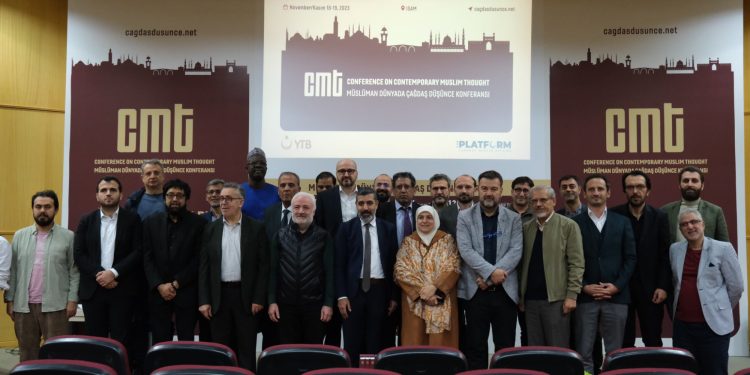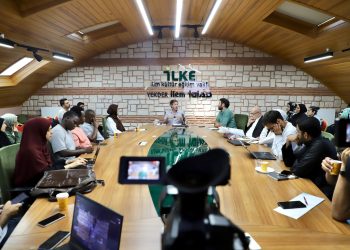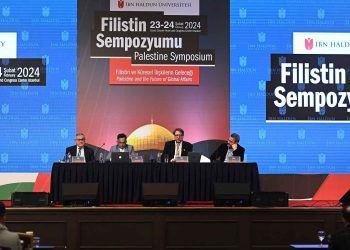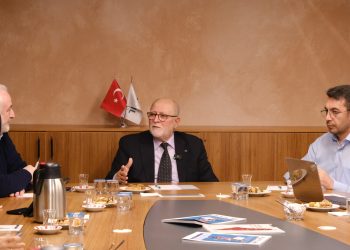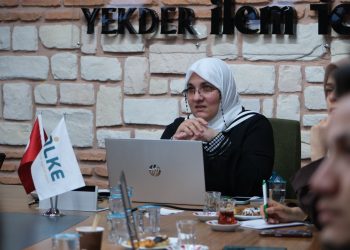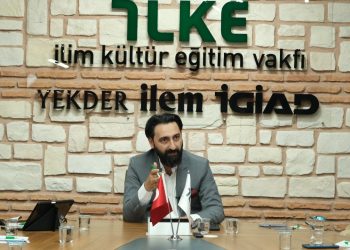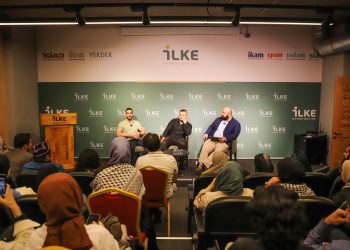The Conference on Contemporary Muslim Thought was held on November 18-19, 2023, featuring 35 experts from Europe, America, Africa, and Asia continents, who participated in 8 separate panels where various topics took place dynamically and interactively. The conference addressed the issues and current developments in the Muslim world while discussing social, economic, and cultural issues affecting Muslims worldwide and proposing solutions. Current problems faced by the Muslim world, especially in Gaza, were opened for discussion by expert researchers and academics.
The panel, consisting of eight sessions, featured speeches on various topics. In the first session, moderated by Necmettin Kızılkaya from Istanbul University, the theme of “Muslim Intellectual Tradition and Academic Studies on Islam” was discussed. Heba Raouf Ezzat from Ibn Haldun University delivered a speech addressing theoretical and practical issues. She analyzed the future of democracy and politics in Egypt within its historical context, evaluating the situation in Gaza accordingly. In his speech titled “The Academic Study of Islam in Africa,” Ousmane Oumer Kane from Harvard University discussed the interventions of social scientists trying to understand Islam’s role in nation-building. He later discussed how globalization, transnational studies, gender studies, and efforts to overcome colonialism have influenced the field. Syed Farid Alatas from the National University of Singapore led a discussion on the emergence and history of social sciences that reflect the fundamental characteristics of Eurocentrism while addressing a specific understanding of liberating knowledge from colonial exploitation. He also emphasized that the effort to decolonize knowledge within anti-colonial thought is crucial in this context. Drawing examples from the intellectual tradition of Muslims, Alatas evaluated current conditions, both theoretically and methodologically, such as Palestine’s years of anti-colonial struggle.
In the second session, moderated by Alev Erkilet from Ibn Haldun University, Hüseyin Mercan from Marmara University discussed “New Challenges to Islamic Movements in the Changing World Politics,” focusing on the global position of Islamist movements and their political institutionalization. Analyzing the problems encountered by Islamist movements in the process of institutionalization and governance, he discussed essential clues regarding political institutionalization along with internal and external factors affecting it. Furthermore, Muhammad Mukhtar al-Shinqiti from Qatar University positioned the fate of the Islamic world amidst the rising East and the declining West within the global system in his speech titled “Destinies of the Islamic World between the Rising East and the Setting West.” China’s economic rise and Russia’s religious-nationalist awakening have a significant position within the global system. In this context, Shinqiti analyzed how this change in global power should be adapted and evaluated concerning its impact on the Islamic World. The third speaker of the session, Wadah Khanfar, president of the Al Sharq Forum, highlighted the ignorance of Western elites regarding events in the Islamic world, particularly in Gaza. According to Khanfar, Western elites struggle to interpret the multifaceted and complex structure of Islamic thought through Western paradigms and perspectives. Hence, they have misconceptions about events in Afghanistan, Iraq, and currently in Palestine. Khanfar emphasized that the fundamental source of these misconceptions lies in mentality, stating that the way the ummah understands politics and power differs significantly from the Western understanding. This understanding removes the concept of power from the monopoly of regional leaders and places it within the ummah’s understanding, intertwined with concepts such as truth and falsehood, martyrdom, sacrifice, and honor. Khanfar also explained that the same issue lies behind the struggle and resistance in Gaza. He discussed the difficulty of eliminating the resilience and resistance displayed by the people. Indeed, with its resistance, Hamas is part of an honorable stance and the people’s resistance, manifesting the ummah’s understanding of the power. In this context, Khanfar emphasized the emergence of a geopolitical consciousness that cannot be explained by concepts of the modern nation state, underlining the inevitability of Palestine becoming an international issue.
In the third session, titled “The Social Dimensions of Muslim Thought,” moderated by Elyesa Koytak from Istanbul Medeniyet University, Salman Sayyid from Leeds University delivered a speech titled “Why Are We All Palestinians?” He discussed the dehumanization of Palestinians and the Palestinization of Islam in the context of political theory, focusing on the question, “What can we propose in the wake of the accelerated massacre of the people of Gaza?” The violence perpetrated by Israel in Palestine is no different from historical examples rooted in colonialism and racism. With this awareness, demonstrations held worldwide reproduce a sense of solidarity and admiration for the courage of the Palestinian people and intensify a sharp inter-ethnic alliance against genocide. According to Sayyid, the reaction is a globally accessible, general concern that will maintain its dynamism.
On the other hand, Sari Hanafi from the American University of Beirut analyzed the problems posed by late modernity in the political, socio-economic, and cultural realm in his speech titled “Symbolic Liberalism in the Muslim World.” Among these issues are the simultaneous rise of authoritarianism in the South and right-wing populism in the North, increasing inequality, insecurity, and trends of exclusion, as well as the emergence of hierarchical social polarization. At this point, the question of how social sciences, especially sociology, should respond to the problems of late modernity arises as an important one. Hanafi noted that the majority of responses to these problems are classically liberal but not politically liberal and defined this composition as “symbolic liberalism.” In contrast, he proposed a “dialogical sociology,” which addresses social inequality and advocates for justice. Irfan Ahmad from Ibn Haldun University, on the other hand, in his speech titled “Notes on Shahab Ahmed’s ‘What is Islam?'” engaged with Ahmed’s text to shed light on how Muslim thoughts should and should not be written on such themes.
In the fourth session, “Reimagining Islam between Past and Future,” moderated by Mohammad Affan, the director of Al Sharq Academia, Muqtedar Khan from the University of Delaware addressed the question, “Has Islamic Revivalism Failed? Is It Time to Think of Muslim Revival?” Evaluating the situation of the Muslim Brotherhood and resistance movements within the context of Islamic awakening, he emphasized the necessity of questioning why we do not have the power to stop this genocide when considering the reactions of Muslim communities to the genocide in Gaza. He proposed that Muslim thought should be shaped by Islamic values. Additionally, Ovamir Anjum from the University of Toledo, in his speech titled “The Future of Islamic Political: Resources of the Ummatic Imaginary,” addressed the place of “politics” in Islam, distinct from its general meaning, with the mission of establishing justice and welfare.
On the second day of the conference, the first session, titled “Decoloniality and Muslims,” Mansour Kedidir from the Center for Research in Social and Cultural Anthropology discussed “Connections of Maghrebin and Sub-Saharan Intellectuals: Trajectories and Representations” around the multifaceted crises experienced by Maghreb and Sub-Saharan African intellectuals. Yusuf Ziya Gökçek from Marmara University discussed the use of cinema as a tool of colonial domination and the transformation of the Muslim image into a representation of the anti-colonial efforts of Islamism in his speech titled “The Muslim Image in Early Cinema: A Colonial Beginning.” Meanwhile, Serhat Orakçı addressed “Pan-Africanism and Muslims in Africa” and delivered his speech on the impact of the Pan-African thought movement on Muslims in Africa during the peak of racism and colonialism.
The second session, “Practical Challenges of Muslim Thought,” focusing on the themes of society and economy, was moderated by Alparslan Açıkgenç from Üsküdar University. Adeel Malik from Oxford University discussed contemporary economic development challenges in Muslim societies from the perspectives of moral and political economy in his speech titled “Social Justice in Islam: Perspectives in Moral and Political Economy.” Mahmut Hakkı Akın from Istanbul Medeniyet University examined the similarities and differences between the Muslim intellectuals Malek Bennabi and Alija Izetbegovic based on their respective periods and societal influences shaping their ideas and works. Taha Eğri from Kırklareli University discoursed “Challenges of State Building and Institutionalization in the Middle East: Egyptian Experience,” explaining the significant effects of colonialism on the political, social, and economic landscape of the region through the example of Egypt.
The third session, moderated by Serhan Afacan from Marmara University, focused on “Asia: New Perspectives Beyond Geographies.” Burak Çalışkan from the University of York discussed “Contemporary Muslim Thought and Debates in Uzbekistan,” shedding light on the contemporary and historical Islamic movements and thoughts in Uzbekistan, which hosts many Muslim scholars and Islamic movements. Khairudin Aljunied from the National University of Singapore emphasized the importance of ethics, virtues, and values in shaping Muslim communities in Southeast Asia in his speech titled “Muslim Intellectualism in Southeast Asia.” Khosrow Bagheri Noaparast from Tehran University evaluated the debates and development of social sciences in Iran after the revolution, assessing thought movements that emerged from Islamic thought or aimed to provide a new trend compatible with the Islamic domain of society.
The final session of the conference, themed “Balkans: Resilient Identities, Authentic Quests,” moderated by Berdal Aral from Istanbul Medeniyet University, began with a speech titled “Muslim Worldview as an Alternative Paradigm or Only Possible for Muslim Geography” by Admir Mulaosmanović from International University of Sarajevo. Mulaosmanović argued that Muslims have the opportunity to be a global political subject and proposed overcoming insecurities as intellectuals to complete this type of subject formation. Afterward, Hazim Fazlić from Lake Forest College discussed topics such as the Bosnian War, the challenges of new interpretations of Islam, the Islamic tradition of Bosniaks, and the place of Muslims in Europe in his speech titled “Modern Muslim Thought in Bosnia: New Trends Among the Muslim Scholars.” Sevba Abdula, the founder of the Balkan Studies Foundation, examined the transformation of Muslim identity in the Balkans, the impact of nation-building processes, and changes in social structure in his speech titled “Muslim Identity in the Balkans.”
Throughout the conference, the focus of the main issues and discussions regarding the problems of the Muslim world was on the events in Gaza. The ongoing genocide that began on October 7 in Gaza, inseparable from the 75-year-long occupation in Palestine, was discussed from various methodological perspectives and approaches. The issues caused by Eurocentric ideologies and perspectives were identified as critical problems that require extensive changes, particularly in this context. Various suggestions and proposals were discussed about the importance of offering an alternative to the European-centric system by utilizing the knowledge and expertise of Muslim intellectuals, scholars, and experts.





































